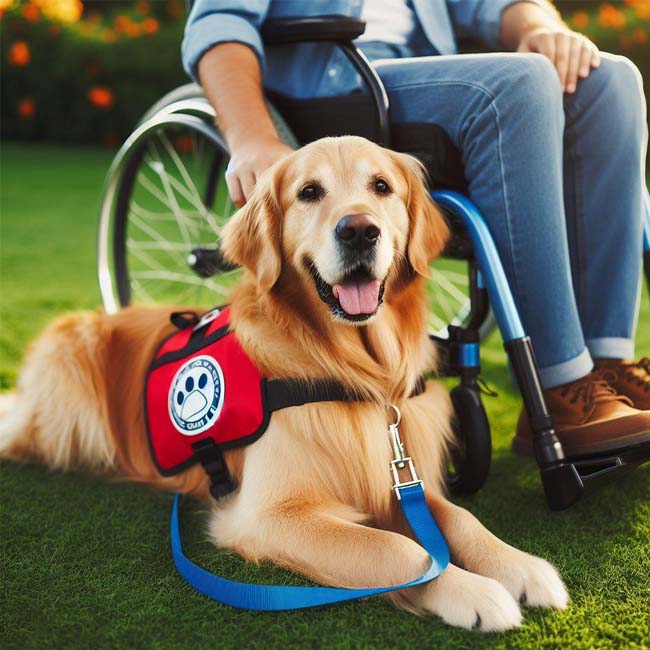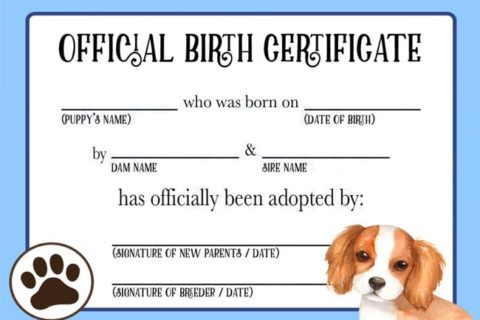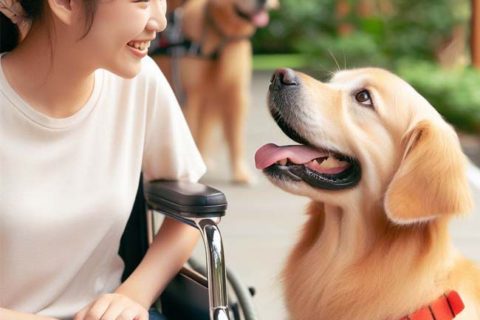A service dog basically serves as a helper dog for people with disabilities whatever they may be to carry out tasks related to the owner’s needs, for example, guiding the blind and navigating the environment around them.

To eliminate discrimination against people with disabilities, the government gives service dogs privileges to gain access to places where they “should not be allowed,” such as hospitals, schools, hotels, and other places they may visit.
However, this good news also brings bad news, in which irresponsible parties misuse this awareness effort. Many definitely take advantage of this situation by providing fake service dog registrations. Whereas, service dogs don’t specifically need a certificate.
So, what does a fake service dog scam under the guise of a professional dog training program look like? Okay, here’s everything you should know about the scam of service dog registration!
Don’t Believe in Service Dog Registration! Why?
If you’re required to register your dog with certain parties, either online or in person, to get a service dog registration, you shouldn’t be aware, it’s totally a scam.
Usually, scam companies will sell dogs equipped with a certificate or a license, but without any appropriate testing regarding their temperament, behavior, and obedience. So, we’re doubtful about getting a service dog from this kind of company that can really help people with disabilities in their daily lives.
In fact, the Americans with Disabilities Act (ADA) doesn’t require service dogs to go through a professional training program to get a certified registration. The ADA also emphasizes that service dogs don’t need any documents to confirm that they have been trained, certified, or licensed as service animals.
Under certain circumstances, if your local government requires all dogs to be registered, vaccinated, or licensed, it may apply to your dogs. But this is not to claim that service dogs must have a certificate; it may instead confirm their health and conditions.
Since a professional training dog for a service dog is pricey, the ADA even allows people with disabilities to train them by themselves at home. Many believe that training a dog to be a service dog at home will be easier since he will immediately adapt to his owner and environment.
To note: This service dog registration fraud is completely illegal and harms people who truly need and depend on service animals for their daily lives. If they actually buy a fake service dog that has no ability to help, this will really make things difficult for them, right?
A Real Service Dog vs. A Fake Service Dog
If you purchase a dog from such a company that claims to be a service dog, but he does some trouble, such as defecating at home, damaging your furniture, or behaving aggressively towards family members, we must say that “the dog is a fake service dog.”
There’s no doubt that a fake service dog is simply a pet whose owners have decided to call “service animals.” Those who decide to sell and buy these fake service dogs are usually in order to be able to take them to various prohibited places as well as to avoid paying pet fees in rental accommodation or on airplanes.
This behavior of fake service animals is proof that many companies commit fraud by offering professional dog training to gain official registration, but the dogs do not reflect that of a service dog.
A real service dog, on the other hand, is one who is highly trained and can help people with disabilities with daily tasks, maintain independence, and also lead them to enjoy a better quality of life.
The main task of real service dogs is to enhance the lives of people with disabilities so they can deal with any challenges on a daily basis. Sure, service dogs should be able to adapt to people with various types of disabilities, ranging from physical, psychiatric, sensory, intellectual, or other mental disabilities.
For example:
- Service dogs trained for psychiatric services can help people with disabilities related to mental disorders, such as post-traumatic stress disorder, obsessive-compulsive disorder, schizophrenia, and other mental disorder conditions.
- The kinds of tasks that a psychiatric service dog performs include interrupting someone’s repetitive behaviors, turning on a light to help people with a stress-inducing condition, and reminding an individual to immediately take medication to avoid seizures.
- Hearing service dogs are the dogs which are trained to help alert people with hearing skill to important sounds.
- Mobility services dogs are the ones that can help people who have balance problems in using wheelchairs or walkers or who have balance problems.
- Service dogs that are trained to alert people with medical problems will immediately act to prepare any medications immediately before an unwanted thing happens, such as seizure or the presence of allergen on their owner’s body.
What Skills Should a Service Dog Have?
Basically, service dogs that are truly helpful are not required to have a certificate or undergo skills training. However, it’s a different story if someone wants to use their dog to gain benefits similar to the privileges that service dogs get.
But service dogs should at least have specific requirements that not just any dogs can qualify for. And it cannot only be determined by a certificate, but more than that, which is more about the skill of the dog itself.
At least, a service dog should:
- Have good social skills. A service dog should really know how to behave around people, especially in public places. He will not bark at strangers or even run toward them. He must not be easily distracted, and its focus should only be on its owner.
- Have extraordinary obedience. A service dog will walk calmly without pulling on the leash when he is accompanying his owner. And he should do what the commands give, such as “wait,” “sit,” and “stand.”
- Not endanger the owner. A service dog basically helps people with disabilities to be more independent by preparing what they need. Of course, he mustn’t threaten the owner, let alone pose a threat to their safety and health.
Well, a service dog must actually have some of these skills.
If you happen to have a service dog, but he behaves the opposite of the skills mentioned above, such as disrupting, pulling on a leash, sniffing around, and even getting distracted easily due to other people or objects, it can be sure that he’s a fake service dog.
In another case, if you look at an individual around public places and claim to be accompanied by a service dog, but the dog’s behavior is in no way reflective of a service dog, it’s clear that they might be lying.
Well, you can now tell which is a real service dog and which is a fake one based on their behavior. So, if one day you are offered a service dog complete with a certificate, but the dog misbehaves, it’s better not to take it.
How to Avoid Service Dog Training Scam
In fact, there are dozens of organizations that really provide a trusted and eligible online service dog training program, but some of them actually commit fraud. Of course, you may find it hard to choose which training is legitimate and which is a scam.
If there’s an organization that requires you to re-register your service dog annually, you must be careful since you can be certain that they’re scammers.
To make it easier for you to identify whether or not the service dog training program is a scam, we’ll show you some spots that signal something wrong. Here they are:
- They don’t provide complete information about the training program.
- They claim that service dog registration is recognized by the federal government, airlines, and housing. Whereas, there’s no service animal registry that is operated by the government.
- They don’t understand how a service dog works. To test them, you can try to contact their support team.
- Their training program is not accredited by a recognized accrediting agency, such as Assistance Dogs International (ADI) or the International Guide Dog Federation (IGDF).
- They get poor online reviews.
- There’s no information or documentation regarding the service dog training.
- They don’t provide a physical address or complete contact information.
- They offer unrealistic promises or guarantees.
- They have a poorly designed website.
- Etc.
If you notice one or more scam signals, as mentioned, you shouldn’t consider enrolling in their service dog training program or even purchasing a service dog from them. Be careful!

A bookworm and researcher especially related to law and citizenship education. I spend time every day in front of the internet and the campus library.




